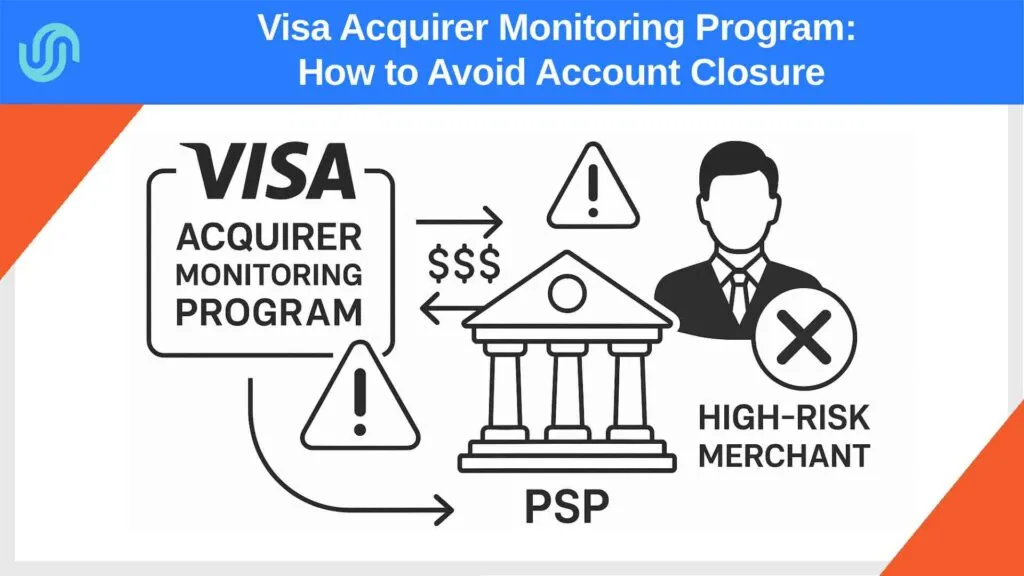Since April 2025, Visa has been rolling out the Visa Acquirer Monitoring Program (VAMP) — a unified framework that tracks both fraud (TC40) and non-fraud disputes (TC15) across the portfolios of acquiring banks and PSPs.
From October 2025, the enforcement phase of the Visa VAMP program begins: Visa will start applying fines and restrictions to acquirers that exceed risk thresholds. This shift is already causing concern across the industry, with many fearing a wave of merchant account closure 2025 cases if they fail to adapt.
The New Reality: Portfolio-Level Risk under the Visa Acquirer Monitoring Program
Under the Visa Acquirer Monitoring Program (VAMP), Visa no longer looks only at individual merchants. It now measures aggregate ratios across the entire acquirer portfolio, and flags acquirers as:
| Entity | Threshold category | Ratio (disputes ÷ transactions) | Effective from |
|---|---|---|---|
| Acquirers / PSPs | Excessive | ≥ 0.50% | April 2025 |
| Above Standard | 0.30–0.49% | January 2026 | |
| Individual merchants | Excessive | ≥ 1.50% | October 2025 |
| Excessive (new limit) | ~0.90% | January 2026 |
This means one high-risk merchant could potentially jeopardize an entire PSP’s access to Visa, which may explain why major providers like Rapyd, Checkout.com, Adyen, Worldline, PPRO, and Paydo are reportedly tightening onboarding and becoming more selective with risky clients to protect their averages.
For many high-risk merchants, this results in more merchant account declined visa responses — even from PSPs that used to accept them.
Why This Hits PSPs So Hard: Collective Responsibility caused by Visa Acquirer Monitoring Program
VAMP makes every PSP collectively responsible for the behavior of their entire merchant portfolio.
- Even if 95% of their merchants are clean, a single large risky merchant pushing dispute ratios above the psp chargeback threshold (0.5%) can pull the entire portfolio into the VAMP “Excessive” zone.
- Once flagged, the PSP is forced to submit remediation plans, pay fines, and risks eventual restrictions or termination of their ability to process Visa traffic.
This fundamentally changes the economics of risk:
Acquirers can no longer “offset” a risky merchant with enough low-risk volume — they must prevent risky volume entirely, or face merchant account terminated high risk incidents that damage their reputation and licensing.
Why Subscriptions Are at Risk
Industries with frequent chargebacks and friendly fraud are now under heavy scrutiny:
- iGaming / betting
- Forex / crypto platforms
- Adult & dating
- Subscriptions with free trials
- Digital goods, games, micro-transactions
- High-risk eCommerce (nutra, dropshipping)
Take into account that Subscriptions are not considered “low risk” too — Visa explicitly warns that unclear cancellation flows, forgotten trials, or unverified billing create spikes in disputes.
As a result, many merchants in this sector are seeing subscription payments approval issues when applying for new card processing accounts.
What Happens Next: Client Flight From “Card-Only” PSPs
Because of VAMP, the market is entering a portfolio de-risking phase:
- PSPs that rely only on Visa/Mastercard acquiring and don’t have alternative rails will be forced to reject or offboard entire verticals to keep their portfolio ratio below 0.5%.
- Merchants in high-dispute verticals (iGaming, forex, subscriptions, digital goods) will see higher decline rates and fewer approvals at such PSPs.
- As a result, there will be a temporary but inevitable outflow of clients from “card-only” PSPs toward payment providers who can diversify risk across non-card methods.
This is the core structural shift:
VAMP does not only pressure “bad” merchants — it rewards PSPs who can offer non-card rails, and penalizes those who cannot.
How WiseAlt Can Help High-Risk Merchants Improve Their Numbers
WiseAlt works as a strategic payments architect: we help merchants lower their VAMP ratio not by “hiding” risky traffic, but by diversifying it across alternative rails and making the card volume that remains fully compliant.
This approach directly helps high risk merchant account approval — by making your profile less toxic to PSPs, we drastically improve approval rates even for complex models.
Our playbook includes two coordinated pillars:
Off-Visa Rails: Reduce Risk Volume
Goal: move part of your highest-dispute traffic off the Visa network so it no longer affects your acquirer’s VAMP ratio.
- Open Banking instant payments — fast local bank-to-bank rails (EU, UK, Brazil, etc.) with near-zero chargeback risk.
- Alternative Payment Methods (APMs) like Sofort, iDEAL, Pix, Trustly, SEPA instant — not included in Visa dispute metrics, ideal for low-value or recurring users.
- eWallet top-up flows — customer funds their wallet via card, then spends off-card; this keeps card disputes on the top-up side and separates retail logic.
- Crypto acceptance with fiat off-ramp — reduces card exposure for cross-border or unbanked segments, especially useful in high-dispute geographies.
These flows sit outside Visa’s dispute monitoring, directly reducing both the numerator and the denominator of the VAMP ratio for your PSP. They are the most effective way to reduce chargeback ratio at portfolio level. We would be glad to assist you with onboarding to the backup PSPs.
Visa Optimization: Fix What Remains
For the card traffic you keep, it’s the responsibility of your PSP to implement advanced Visa risk controls.
WiseAlt does not build these systems directly, but we can recommend trusted IT partners or solution providers who can help your PSP design and deploy them effectively.
Typical measures include:
- 3DS 2.2+, network tokenization and Account Updater
- Anti-enumeration tools and BIN/geo velocity rules
- Clear descriptors, pre-renewal emails, cancel confirmation
- Centralized dispute monitoring & compelling evidence automation
These steps — when implemented by your PSP — help lower friendly fraud, reduce chargebacks, and position you as a low-risk merchant in Visa’s eyes, which in turn improves your approval rates and relationships with acquirers.
The Bottom Line — The Market Is Changing, But WiseAlt Helps You Stay in the Game
VAMP changes the game: acquirers are now judged by the average risk of their entire portfolio.
If your vertical naturally carries higher dispute ratios, simply applying for more merchant accounts won’t work — you need to rebalance your traffic mix.
PSPs who fail to offer non-card payment methods will likely face client churn, while those who master Open Banking, APMs, wallets and crypto will absorb that demand.
That’s what WiseAlt does best:
- selecting PSPs with the right risk appetite,
- shifting high-risk segments to open banking, APMs, wallets and crypto,
- and hardening your remaining card flows for Visa compliance.


